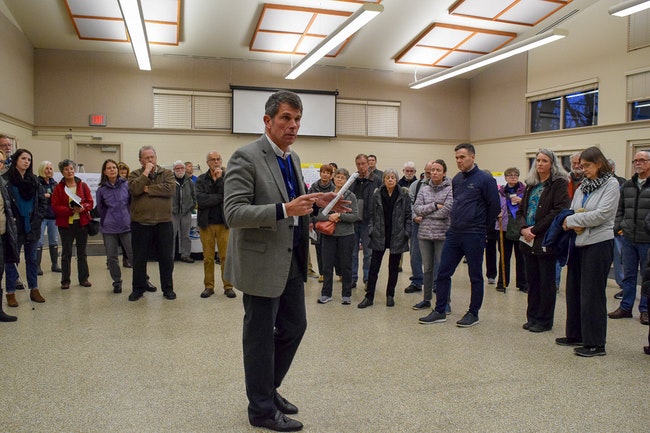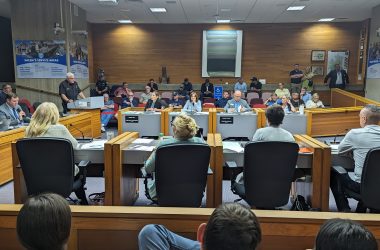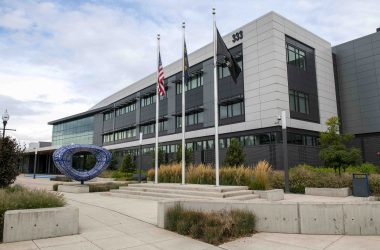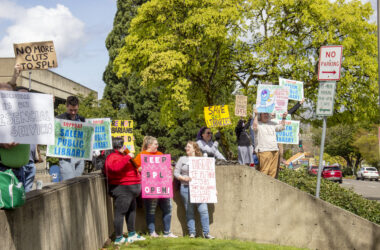 City Manager Steve Powers responds to questions from the crowd of neighbors at Pringle Community Hall. The city plans to turn the hall into an emergency homeless shelter through the end of March. (Saphara Harrell/Salem Reporter)
City Manager Steve Powers responds to questions from the crowd of neighbors at Pringle Community Hall. The city plans to turn the hall into an emergency homeless shelter through the end of March. (Saphara Harrell/Salem Reporter)
Neighbors of a community center near downtown Salem made their concerns known Thursday over plans to turn it into an emergency homeless shelter.
Roughly 50 people filled Pringle Community Hall, nestled into a wooded park near a creek and historic homes, to tell city officials they were worried what the temporary move would do to the area. They largely worried it would bring trash and bad behavior.
The Salem City Council is expected on Tuesday, Jan. 21, to formally declare the city’s homeless crisis an emergency, enabling the city to quickly take actions.
Among the council’s plans is to turn the community hall into a seven-nights-a-week shelter, open from 7 a.m. to 7 p.m., to serve 37 homeless residents. If the emergency’s declared, city may set up the shelter within days.
The hall at 606 Church St. S.E. is regularly used for meetings, birthdays, wedding receptions and similar parties, a city spokesperson said.
City officials organized the open house Thursday to talk about the plans with neighbors, who let their concerns fly for nearly 90 minutes.
“I’ve had three altercations (with homeless residents) already,” said Brent Koester, a resident of the Gaiety Hill neighborhood for 17 years. He said people have pulled knives on him and left trash around his property, such as shopping carts. “I can’t tell you how many shopping carts,” he said.
Many said they tried to balance compassion for the homeless residents with their frustration with city actions concerning their neighborhood.
“We’re profoundly in a pickle,” said Victor Dodier, who lives in the Fairmount Hills neighborhood. “There are no good solutions.”
“A lot of us were taken aback and that was a rough way to treat neighbors,” said Jacqueline Heavey.
City officials on hand, like Mayor Chuck Bennett, Councilor Tom Andersen and City Manager Steve Powers, listened to the neighbors and spoke to give the potential decision more context.
Powers told neighbors it has “no intention to turn it into a warming shelter,” in the future.
The city’s goal is to shelter homeless residents at Pringle Hall through the end of March. In early December, councilors made it illegal to set up tents or other structures on public property in a bid to clear out homeless camps near downtown.
The city intended to make up for the lack of public camping by paying two local churches to expand their shelter services. The city allocated $213,000 for that, but the plan, which would have brought on more than 100 shelter beds, fell apart. A miscommunication between the city, nonprofits and one of the churches led the church to pull out.
A search party ensued, sending city staff and nonprofit leaders on a hunt to find empty buildings that could be feasibly turned into a shelter. They looked at 10 buildings but no deal emerged. Jimmy Jones, executive director for the Mid-Willamette Valley Community Action Agency, blamed “nimbyism,” zoning issues and unwilling property owners.
 Mayor Chuck Bennett responds to questions from the a crowd of neighbors at Pringle Community Hall. The city plans to turn the hall into an emergency homeless shelter through the end of March. (Troy Brynelson/Salem Reporter)
Mayor Chuck Bennett responds to questions from the a crowd of neighbors at Pringle Community Hall. The city plans to turn the hall into an emergency homeless shelter through the end of March. (Troy Brynelson/Salem Reporter)
Homeless residents, meanwhile, moved into downtown to stay under business’ awnings and overhangs. The city recently declared two such areas a health hazard.
With the plan now to convert Pringle Hall, which the city already owns, neighbors there are now frustrated with city leaders. Many in attendance said they were “disappointed.”
“I need to call out the city a little bit,” one man said, who left shortly after his comments. “I’m really disappointed in the way this was handled.” The man also publicly pressed Powers to promise Pringle Hall wouldn’t be used as a homeless shelter again in the future. Powers agreed.
Some worried homeless residents might loiter in the area once the shelter hits capacity and volunteers start turning people away at the door. They worried about trash accumulating.
“We have had issues,” said Suzanne McKenna, who lives nearby. “Is it our responsibility to hire security?”
Jones and Powers told the crowd there would be security and at least one portable toilet on site. Andersen also called for a review within the next few weeks.
Two men worried the hall could flood in the coming weeks since it is adjacent to Pringle Creek.
Some vented frustration the state government hasn’t offered the Oregon State Fairgrounds as a place for shelter or camping. Powers said he talked with fairground representatives, who said this year wouldn’t work but perhaps next year.
Others returned to that sentiment of being disappointed with the situation from the start. Lori Abney-DeCamara said she felt the city’s camping ban “made the problem worse.”
“At least with the tents it was a little more contained,” she said. “But now we have to have a better solution to that, too.”
Mona Abney-DeCamara said the downtown core has deteriorated since she moved there a year-and-a-half ago.
“It was thriving — restaurants, nightlife,” Abney-DeCamara said. “Now I don’t want to go downtown.”
Lori Abney-DeCamara said after the meeting that neighbors are going to keep an eye on the situation.
“I think they’ll make a strong effort to keep it under control,” she said. “If it doesn’t work, we’re going to hold their feet to the fire.”
Have a tip? Contact reporter Saphara Harrell at 503-549-6250, [email protected] or @daisysaphara. Contact reporter Troy Brynelson at 503-575-9930, [email protected] or @TroyWB.









